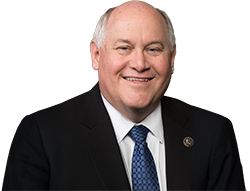Rep. Estes Applauds Treasury Guidance for Small Business PPP Loans
Washington,
May 13, 2020
|
Roman Rodriguez
(316-262-8992)
WASHINGTON – Congressman Ron Estes (R-Kansas) applauded the Department of the Treasury's additional guidance for Paycheck Protection Program (PPP) loans today. The FAQs indicate business owners who accepted loans under $2 million will be deemed to have met the required certification concerning the necessity of the loan request in good faith.
"With so many small businesses hurting from forced closures and stay-at-home orders, there is a clear need to provide stability and certainty in these unprecedented times," said Rep. Estes. "Today's announcement provides peace of mind for Kansas PPP recipients and their workers. This also allows SBA to focus on larger companies who received PPP loans greater than $2 million to determine whether or not they satisfied the economic uncertainty requirement in good faith." Rep. Estes voted for the CARES Act, which included the PPP, as well as additional funding for this popular program. During the first and second rounds of the Paycheck Protection Program (PPP), $5,162,470,043 has been approved for 47,351 Kansas small businesses in the form of forgivable loans as of May 8. The full text of Treasury's FAQ regarding the safe harbor provision is below, and all of their FAQs issued today can be accessed here. Question: How will SBA review borrowers' required good-faith certification concerning the necessity of their loan request? Answer: When submitting a PPP application, all borrowers must certify in good faith that "[c]urrent economic uncertainty makes this loan request necessary to support the ongoing operations of the Applicant." SBA, in consultation with the Department of the Treasury, has determined that the following safe harbor will apply to SBA's review of PPP loans with respect to this issue: Any borrower that, together with its affiliates, received PPP loans with an original principal amount of less than $2 million will be deemed to have made the required certification concerning the necessity of the loan request in good faith. SBA has determined that this safe harbor is appropriate because borrowers with loans below this threshold are generally less likely to have had access to adequate sources of liquidity in the current economic environment than borrowers that obtained larger loans. This safe harbor will also promote economic certainty as PPP borrowers with more limited resources endeavor to retain and rehire employees. In addition, given the large volume of PPP loans, this approach will enable SBA to conserve its finite audit resources and focus its reviews on larger loans, where the compliance effort may yield higher returns. Importantly, borrowers with loans greater than $2 million that do not satisfy this safe harbor may still have an adequate basis for making the required good-faith certification, based on their individual circumstances in light of the language of the certification and SBA guidance. SBA has previously stated that all PPP loans in excess of $2 million, and other PPP loans as appropriate, will be subject to review by SBA for compliance with program requirements set forth in the PPP Interim Final Rules and in the Borrower Application Form. If SBA determines in the course of its review that a borrower lacked an adequate basis for the required certification concerning the necessity of the loan request, SBA will seek repayment of the outstanding PPP loan balance and will inform the lender that the borrower is not eligible for loan forgiveness. If the borrower repays the loan after receiving notification from SBA, SBA will not pursue administrative enforcement or referrals to other agencies based on its determination with respect to the certification concerning necessity of the loan request. SBA's determination concerning the certification regarding the necessity of the loan request will not affect SBA's loan guarantee. Ron Estes is a 5th generation Kansan and represents Kansas’ 4th Congressional District in the U.S. House of Representatives. He serves on the House Committee on Ways and Means. |







